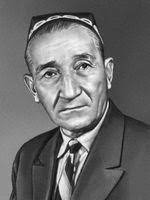SHARE WITH FRIENDS:
One of the most famous representatives of Uzbek literature Gafur Gulam was born on May 1903, 10 in Kurgantegi mahalla of Tashkent. Orphaned from his father at the age of nine and from his mother at the age of fifteen, Gafur was educated first in an old school and then in a Russian-style school. He completed a teacher training course in the years following the October coup and taught in new-style schools. From 1923 he was the director and educator of the orphanage, then worked in the editorial offices of the newspapers "Poor Farmer", "Red Uzbekistan", "Sharq Haqiqati". For him, the newspaper plays the role of a dorilfun, an important tool in the study of the life of the people, in his active involvement in it. His first collections of poetry, Dynamo and Living Songs, were published in 1931-1932. In 1930-1935, the poet wrote the epic "Kokan", the ballads "Wedding", "Two documents". However, a number of the poet's poems, in particular, the epic "Kokan", which we have long praised as a great work on the theme of collectivization, did not meet the requirements of modern times. In particular, it is not realistic about the fact that the policy of collectivization, which has been praised from the very beginning, has led to endless oppression, along with certain positive results. His poems about the party, the homeland, Lenin, and October also show a tendency to modernity. Due to this, the poet's work today requires a critical approach. It is true that the author has revised some of his works created under the influence of the cult of personality during his lifetime. He rewrote some of the verses, giving the poem naturalness and vitality. The same is true of his poems "Observation", "You are not an orphan", which were also reworked by the writer. In the 30s, Ghafur Ghulam wrote short stories, essays, and feuilletons, as well as short stories such as Netay, Yodgor, and Tirilgan Murda. During the war years, the poet devoted all the warmth of his work to the people fighting against the fascist invaders, creating poems imbued with the spirit of confidence in his inevitable victory. He wrote poems, journalistic essays and articles such as “You are not an orphan”, “Observation”, “Time”, “Missing” and led the people to the victory of war and labor. In the post-war years, Ghafur Ghulam also wrote extensively in many genres of literature, created high-quality works of art, and published a number of excellent articles on journalism and literary criticism. His work appeared as a unique chronicle of the people's life in this period. If Ghafur Ghulam rose to the level of a philosopher-poet with his poetic works during this period, he is a skilled prose writer who knows the life and spirit of the people well with his stories such as "The Silent Child" and "My Thief's Child". demonstrated that. Ghafur Ghulam also made a great contribution to the establishment of the Uzbek school of translation. He translated such masterpieces of world and Russian literature as Othello and King Lear into Uzbek with great skill. Ghafur Ghulam was a full member of the Academy of Sciences of Uzbekistan (1943). On the occasion of his 60th anniversary, he was awarded the honorary title of People's Poet of Uzbekistan (1963). Many of the poet's works have been translated into Asian and European languages. Gafur Gulam, a fiery herald of Uzbek poetry and a great artist, died on July 1966, 10 in Tashkent.
Source https://tafakkur.net/gafur-gulom.haqida
